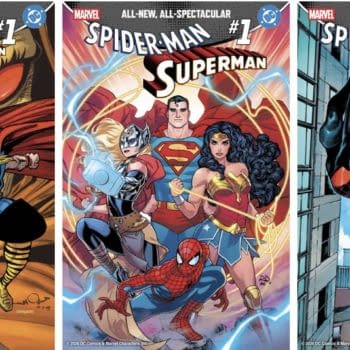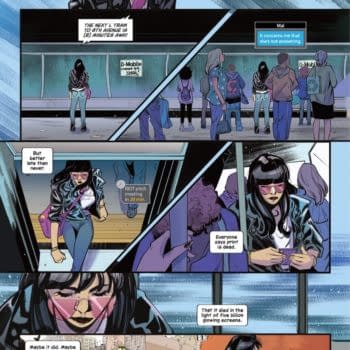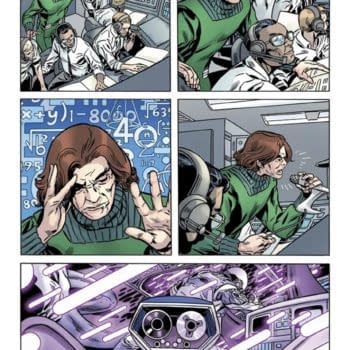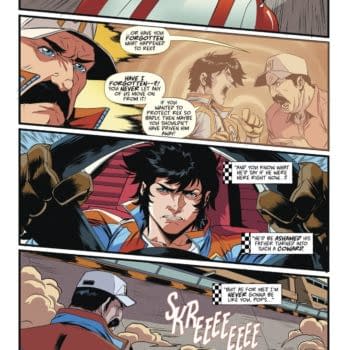Posted in: Comics, san diego comic con | Tagged: cameron stewart, chuck palahniuk, dark horse comics, David Mack, Fight Club 2
SDCC '15: Live! From The Fight Club 2 Panel With Chuck Palahniuk, David Mack, And Cameron Stewart

Now an absolutely packed room settled in to hear the entire creative team behind the immensely popular comic talk about Fight Club 2. Palahniuk was joined by Cameron Stewart and David Mack, and the three were hosted by Dark Horse Editor-in-Chief Scott Allie.

Scott Allie showed some of the early promo images for Fight Club 2 and reflected on the announcements that were made at SDCC last year regarding the book.
Chuck Palahniuk informed the audience that he's commissioned "scratch and sniff" style scented bookmarks of which fans will have to guess the scents of the bookmarks. The smells are "mostly horrible" Allie joked and Palahniuk didn't exactly disagree. The bookmarks will be available through retailers, first one variety, then later on a second.
Allie asked the panelists to talk about the early days of working on the comic and working together in Portland. Cameron Stewart said a "sticking point" was that Palahniuk wanted to work with someone local, but he didn't live in the USA, however, he immediately made the decision to rent a place in Portland over the summer to work on the book. They'd get together, often at colorist Dave Stewart's house.
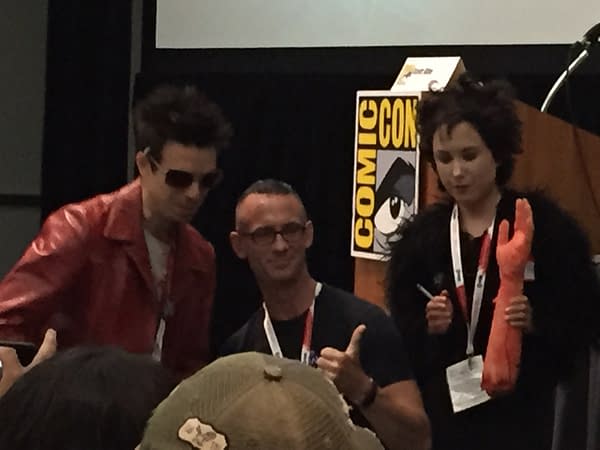
When asked if he'd ever make a Fight Club 2 film, or allow one, Palahniuk said that he's aware that Fight Club is being adapted into a Rock Opera, and that he doesn't want to step on anyone's toes by working on another project of that kind at the same time. He wishes that project the best.
Palahniuk said, when asked, that he didn't give the narrator of Fight Club, now revealed to be named Sebastian in Fight Club 2, a name is because he finds names to be quite an abstraction and it was a specific choice. In the comic, Cameron Stewart really "nails" the gestures that are necessary to really depict character, he said, and praised that absence of abstraction in the comic.
A fan asked how Palahniuk manages to write a comic sequel to a book that's essentially based on a "theme". Palahniuk said that it's like going to church, something that becomes a "practice", just like the need to keep going to language classes to keep the knowledge fresh. Fight Club is not about "one and done" for him, but something that "has to be done on a regular basis" as a way of thinking that's comparative to religious practice. You have to "do it over and over and explore it or lose it", he said. Palahniuk also said that the sequel is very much about the "same themes but from a different angle".
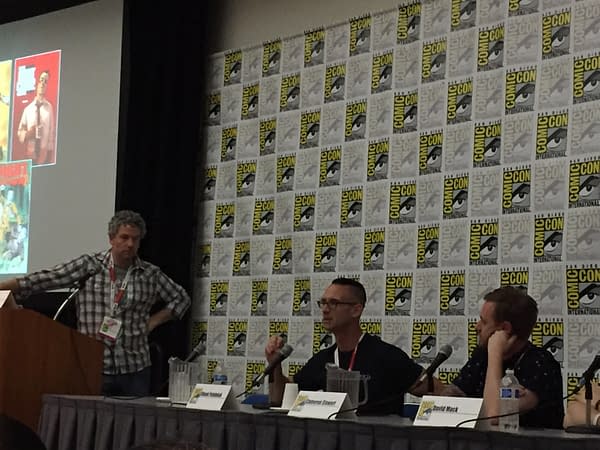
There was a sequence Palahniuk discussed with Scott Allie where bodily fluids appear to be staining the page, and Allie actually encouraged him to go further and "shock people". "That's not something that Double Day would let me do", he said. He fought with them over things in the book like having soap based on lypo-suction fat, but "with Dark Horse there's no fighting", he said. To a wild round of applause.
When Palahniuk was asked why he named the narrator Sebastian in the comic, nameless in the first prose book, he said there were several names he wasn't able to use for legal reasons, and finally he wanted the name to be Cornelius, after his favorite character in Planet of the Apes (and if he had a monkey he'd name it Cornelius) but he already used the name in "Beautiful You". So he settled on Sebastian, partly because of the "least likeable character in English literature", Sebastian Flyte in Brideshead Revisited, who carries around a teddy bear.
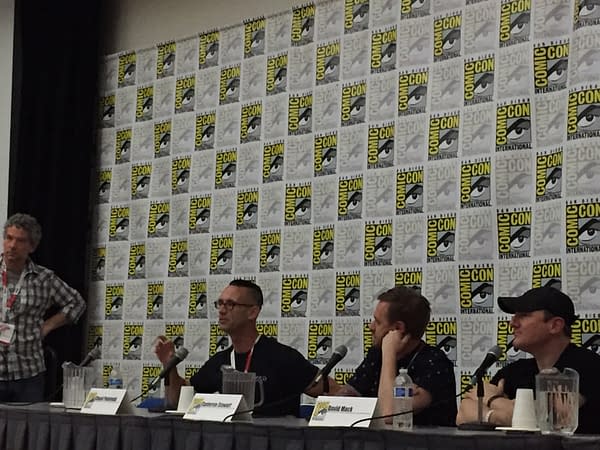
Palahniuk feels inspired by the "non-fiction form" which he lifts from magazines and past examples in art like Citizen Kane's use of journalism, and often uses that faux-real framework for his writing. It helps ingrain setting, for one thing.
When asked how he came up with the name Tyler Durden, he said he had seen a movie starring a boy called Tyler, and he met another little boy as a child who claimed to have been the boy in the film, but to have had facial surgery to look like the character. The boy was such a good liar that he associates the name Tyler with "liar".
The name Durden is less pleasant. It was the name of a man who sexually harassed a young woman he knew of, who was traumatized by the experience, and it was horrific enough an event that he associated the name with "dirt".
The comic "really is that if I thought of it, I put it on the page", Palahiuk said, whereas in the more literary world his editor would have "put him on the choke chain". He focused the panel on David Mack for a few minutes to talk about his psychological covers which convey such internal things so powerfully in his work on the series.
The decision to have Mack do the covers was an immediate response, but Mack has so many different styles that is was like having several David Macks, and Mack didn't know which style they wanted. He sent them several ideas, and still not quite there yet, he sent more, and they'd go back and forth until they found it, he said.
The cover with two boys and the burning house, for instance, was nicely ambiguous since you don't know if it's Tyler and Sebastian or Sebastian and his son. Palahniuk originally asked for there to be a gun in the hand of one child about to pull the trigger on the other child, but Mack suggested that might not be the best idea. They eventually settled on a grenade, and drawing the pin of the grenade meant that Mack had to find an actual pin while passing through Kentucky on the way to LA.
***There will be a signing for Fight Club at the Dark Horse booth, #2615, at 11:00AM on Sunday at SDCC with Chuck Palahniuk, Cameron Stewart, and David Mack .











